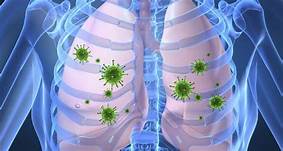

Pneumonia is an infection that inflames the air sacs in one or both lungs. The air sacs may fill with fluid or pus (purulent material), causing cough with phlegm or pus, fever, chills, and difficulty breathing. A variety of organisms, including bacteria, viruses and fungi, can cause pneumonia.
Pneumonia can range in seriousness from mild to life-threatening. It is most serious for infants and young children, people older than age 65, and people with health problems or weakened immune systems.
The Signs and Symptoms of Pneumonia vary from mild to severe, depending on factors such as the type of germ causing the infection, and age and overall health. Mild signs and symptoms often are similar to those of a cold or flu, but they last longer.
Signs and Symptoms of pneumonia may include:
Newborns and infants may not show any sign of the infection. Or they may vomit, have a fever and cough, appear restless or tired and without energy, or have difficulty breathing and eating.
Pneumonia is classified according to the types of germs that cause it and where got the infection.
Community-acquired pneumonia is the most common type of pneumonia. It occurs outside of hospitals or other health care facilities. It may be caused by:
Hospital Acquired Pneumonia : Some people catch pneumonia during a hospital stay for another illness. Hospital-acquired pneumonia can be serious because the bacteria causing it may be more resistant to antibiotics and because the people who get it are already sick. People who are on breathing machines (ventilators), often used in intensive care units, are at higher risk of this type of pneumonia.
Aspiration Pneumonia : Aspiration pneumonia occurs when we inhale food, drink, vomit or saliva into our lungs. Aspiration is more likely if something disturbs normal gag reflex, such as a brain injury or swallowing problem, or excessive use of alcohol or drugs.
Pneumonia can affect anyone. But the two age groups at highest risk are:
Other risk factors include:
Even with treatment, some people with pneumonia, especially those in high-risk groups, may experience complications, including:
Bryonia : Very useful when chest pain accompanies pneumonia. There is stitching pain in chest which get worse on coughing and deep breathing.Indicated when while coughing, the patient needs to hold the chest because of the intense pain. recommended for expectoration of rust or brick colored sputa.There is difficulty in breathing, and there may be fever accompanied by chills.
Arsenic Album : Useful medicine for pneumonia with difficult breathing and shortness of breath. Useful when scanty frothy phlegm is present.Effective homeopathic medicine for treating pneumonia from consuming chilled food items. Indicared when pain located specifically in the upper third of the right lung.There is suffocating feeling, which gets worse on lying down or while sleeping.
Antimonium Tart : Very effective medicine for pneumonia when there is an excessive rattling of mucus in the chest. Useful when lungs are full of mucus which is not expectorated. There is Short and difficult breathing.Useful in the last stages of pneumonia.Very helpful when there is the occurrence of jaundice with pneumonia.
Hepar Sulph : Very effective medicine for pneumonia when the sputa are purulent which may be offensive.Useful for pneumonia in the suppurative stage. There is a loose cough with a rattling of mucus.Also fever with chills accompanying the above symptoms.e.t.c
RL 32 : For All Types of Cough